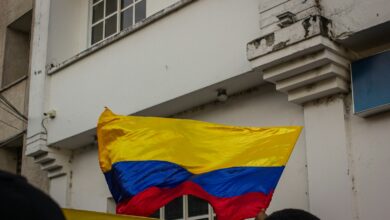Europe Cries Out For Venezuelan Oil Thinking Of Winter
French President Emmanuel Macron calls for sanctions on Venezuelan and Iranian oil to be lifted .

Photo: Wikimedia-Homoatrox
LatinAmerican Post | Santiago Gómez Hernández
Listen to this article
Leer en español: Europa pide a gritos petróleo venezolano pensando en el invierno
Europe is on alert, the risk of a shortage of gas and oil for the coming winter worries the most powerful countries on the continent. Russia has already begun to make good on its threats to cut off gas supplies to "unfriendly" European countries that don't pay in rubles (the Russian currency Moscow is trying to protect).
The Russian energy giant, Gazprom, suspended the supply of gas to Bulgaria and Poland, 2 countries belonging to the European Union and which have generated the greatest rejection towards Russia.
During the G7 meeting, an event that brings together the 7 Western powers, French President Emmanuel Macron asked the rest of the superpowers to lift sanctions on Venezuelan and Iranian oil, according to the Bloomberg media. The French president seeks to stabilize the prices of crude oil in the market and to be able to counteract the rise in prices. All this, under a political crisis that he lives at home where he recently lost the majority in Congress and this could put governance at risk.
In addition to resuming negotiations on the lifting or relaxation of sanctions with the Ayatollah , "Venezuelan oil must also be able to return to the market," Paris announced.
At the summit of leaders that brought together the presidents of Germany, France, the United States, Canada, Italy, Japan and the United Kingdom, the economic crisis and the inflation of products that today affects the entire planet were also discussed, due to the invasion in Ukraine and the sanctions imposed by the West on the Russian regime.
The crisis for the European leaders becomes more acute when they see a cold winter approaching in the future. With the increase in demand for energy to heat homes from the cold, the specter of shortages begins to haunt the heads of the old continent.
You may also be interested in: Did Gabriel Boric and Pedro Castillo Drive Away Foreign Investment in Chile and Peru?
For its part, the United States is aware of the need of the Europeans, an example of this was the partial lifting to export Venezuelan oil to Europe by certain companies.
Precisely, the Venezuelan president, Nicolás Maduro, announced that a new delegation of officials from the Biden administration is in Venezuela to advance the negotiations . However, the game is three-way, since it will not only depend on the progress that Washington and Caracas can achieve, but also Biden will need both Chavismo and the opposition to resume talks and make progress.
The last time both groups met was recently, last week, at the Oslo forum, mediated by the Norwegian government. However, the negotiating table installed in Mexico since 2021 has not made progress and the parties have not returned.
Another proposal that comes out of the meeting of the superpowers is the increase in oil production by the producing countries. Nations like Saudi Arabia, Iraq, United Arab Emirates, Qatar, etc. could increase production and set limits on prices.
For this, the meeting between Joe Biden and the Saudi government in a meeting scheduled for July will be vital. Likewise, Macron maintains constant communication with the Saudi crown prince, Mohamed bin Salmán, and with the president of the UAE, Mohamed bin Zayed. Although, taking action on gas prices will also be vital.
It will also be necessary to negotiate with Qatar, Norway, Australia, Canada, Algeria and Nigeria, the main producers of natural gas after Russia and the United States.
For their part, other European countries, such as Austria, do not rule out increasing energy production in their thermodynamic plants powered by coal. As the looming crisis is countered, the small Alpine country is confident that by tripling gas imports and increasing output from green hydrogen and biogas plants, by 2027, they could no longer depend on Russia.





